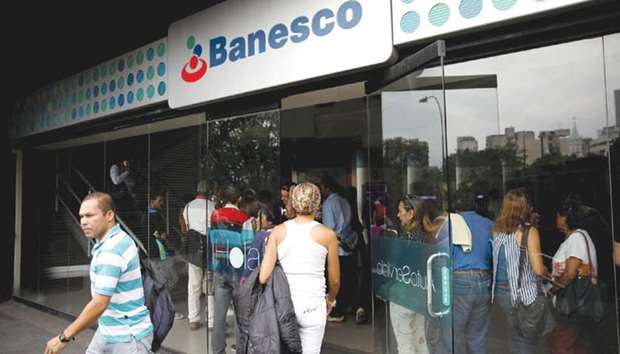Depositors started lining up outside Banesco Banco Universal’s branches in eastern Caracas early Friday morning, hoping to get cash – and answers – after Venezuela’s government seized the nation’s largest privately held bank.
Half a dozen police officers carrying assault weapons stood outside the landmark emerald-glass headquarters of the institution known as Banesco after news of what authorities called a 90-day intervention and arrest warrants for 11 top executives. The government claimed on Thursday the bank speculated on the exchange rate and smuggled paper money out of the country, freezing about 1,000 accounts. The bank’s billionaire director, Juan Carlos Escotet, said the government knows about the accounts only because they were properly reported.
The dramatic move comes just weeks before President Nicolas Maduro’s bid for re-election, in which he’s painted himself as a paladin of socialism. The government says it’s detained more than 130 criminal bankers and executives and now it controls one of the last independent financial institutions. But the economy remains in the throes of quadruple-digit inflation. There are grinding shortages of food and medicine, weeks without running water and hours-long power outages. Now, Banesco’s 8mn clients wonder whether they can touch their scant remaining resources.
“I’m here to get as much cash out as I can, though I don’t expect much because we know there’s no cash to be found,” said Marcos Palmero, a 30-year-old power-company worker waiting outside a branch in El Rosal. “The government has bankrupted everything and now they want to take Banesco and blame it for the country’s terrible situation.”
Banesco has drawn the government’s ire as prices surge and cash becomes scarce. In videos and a letter posted to his Twitter account, Escotet said he would fly to Caracas from Portugal to “face the matter” and personally attend to the case. He also questioned the government’s motives as political and a distraction from plans to redenominate the bolivar in June by lopping off three zeroes from all bills.
“Banesco has been unjustly intervened in due to political motivation,” said Escotet, a Venezuelan who has investments in Europe. “There are no financial motives for this intervention.”
About 31 banks operate in Venezuela, according to their trade association. The biggest, Banco de Venezuela, has been state run since former president Hugo Chavez nationalised it in 2008, taking over from Spain’s Banco Santander SA. At the time, he paid Santander $1.1bn, or about 95% of the unit’s book value at the artificially strong official exchange rate. Banesco, which has faced constant threats of nationalisation, would be unlikely to get such a deal now, as oil production falls to 1980s levels and Maduro struggles to obtain new financing in the face of US sanctions. “Logic should tell them not to intervene the country’s largest private bank, with an economic crisis like Venezuela’s, foreign debt that puts it on the edge of default, collapsing oil production and hyperinflation,” said Alejandro Caribas, a banking consultant and former national superintendent. “What the country needs is to generate trust to attract foreign investment and secure long-term loans.”

A man walks out from a Banesco bank branch in Caracas, Venezuela on Friday. The government claimed on Thursday the bank speculated on the exchange rate and smuggled paper money out of the country, freezing about 1,000 accounts. The bank’s billionaire director, Juan Carlos Escotet, said the government knows about the accounts only because they were properly reported.
